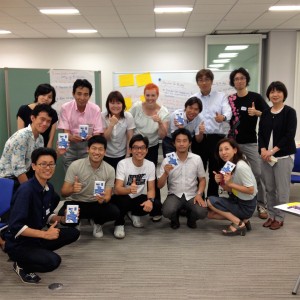Negotiating with tomorrow’s people: Dawn Reeves, facilitator and trainer writing and working in public sector in the UK and internationally, talks about the RENKEI Collaboration programme in Japan.
How do we plan for a sustainable future that meets the needs of generations to come? It’s a massive and complex global question that often falls into the too-difficult box. It’s also tricky at the local level for local authorities and specifically for planners trying to set a spatial framework for the next twenty or thirty years. During 2016 & 2017 in Osaka and in a number of London Councils (Brent, Barnet and Tower Hamlets) I’ve been facilitating groups of local councillors, local authority managers, communities and researchers to get under the surface of the problem.
There are so many unknowns in public life at the moment that thinking ahead so far can seem like a futile exercise. Yet for Planning Authorities in the UK, it’s the fundamental basis of the Planning Framework – the strategy that should inform and support all other strategies. Equally planning a sustainable future means we need to tackle the question of inter-generational conflict? And one of the big problems with future generations is that we can’t involve them in consultation processes because they don’t exist yet.
At the two week RENKEI Collaboration programme in Japan (involving seven UK universities and seven from Japan) we were joined by colleagues from Osaka City Government and Professor Hara of Osaka University who shared research from a futures project carried out in Yahaba Town, Iwate Prefecture.
The work involved a series of participatory workshops where stakeholders created “imaginary future generation” groups to represent tomorrow’s people and asked them to negotiate with present generation about the vision for 2050, the priorities and decision making. It was a fascinating approach (see link below) and one that I’ve taken three key lessons from to use in the UK.
People want to do it
It was clear in all the London sessions that whilst stakeholders were initially apprehensive, they absolutely saw the need to think about the future and there was no shortage of engagement. There was a real dynamism about the conversations focusing on their future families and the legacy they would leave. Framing the questions in personal terms invited deeper and more creative responses and although the elected Councillors involved had limited time on this, they still came up with very useful responses in terms of policy direction. In Osaka, the participants were very keen to role-play their future selves.
Creating an imaginary resident is easier than you think
Another way to support long-term visioning is to work with participants to imagine a fictional resident using a guided vision technique. It can be very straightforward and involves asking questions about the character, their daily lives in the future. The trick with this technique is to ensure participants don’t imagine themselves, to let them flow freely and see/feel how others might live. This technique ensures more diversity; it surfaced useful ideas and priorities.
You have to go a long way into the future to let people go from every day now…
The visions for London and UK based authorities look forward to twenty or thirty years. The project in Yahaba looked much further to 50 years ahead on the basis of research that shows that people often get stuck on the here and now, and to properly image future sustainable places, the gap needs to be bigger.
It’s been a fantastic opportunity for me to work across cultures, in London and Japan, to share and apply learning with highly useful results including: content that informs the development of Local Plans in the UK and in Osaka, the RENKEI work came up with proposals for social enterprises that bring generations together.
Here’s a link to the Japan Osaka University research
http://www.souken.kochi-tech.ac.jp/seido/wp/SDES-2017-19.pdf
And a link to the inspiring Innovation Hub at Osaka City Government
https://www.innovation-osaka.jp/


